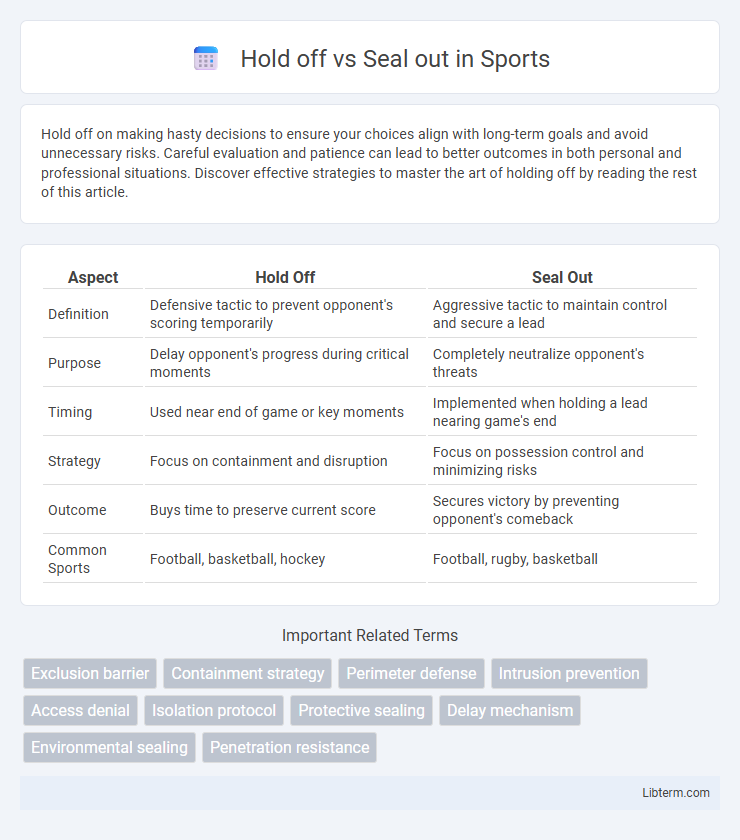Hold off on making hasty decisions to ensure your choices align with long-term goals and avoid unnecessary risks. Careful evaluation and patience can lead to better outcomes in both personal and professional situations. Discover effective strategies to master the art of holding off by reading the rest of this article.
Table of Comparison
| Aspect | Hold Off | Seal Out |
|---|---|---|
| Definition | Defensive tactic to prevent opponent's scoring temporarily | Aggressive tactic to maintain control and secure a lead |
| Purpose | Delay opponent's progress during critical moments | Completely neutralize opponent's threats |
| Timing | Used near end of game or key moments | Implemented when holding a lead nearing game's end |
| Strategy | Focus on containment and disruption | Focus on possession control and minimizing risks |
| Outcome | Buys time to preserve current score | Secures victory by preventing opponent's comeback |
| Common Sports | Football, basketball, hockey | Football, rugby, basketball |
Understanding "Hold Off" vs "Seal Out
"Hold off" refers to delaying or postponing an action or decision temporarily, while "seal out" means to completely prevent entry or access, often by physical means. Understanding "hold off" involves recognizing a strategic pause or waiting period, whereas "seal out" indicates a final, definitive barrier or exclusion. The distinction lies in "hold off" implying a reversible delay, in contrast to "seal out" conveying a permanent cutoff or protection.
Definitions and Core Differences
Hold off refers to delaying or postponing an action, often to assess conditions or gather more information before proceeding. Seal out means to completely exclude or prevent entry, typically by creating a secure barrier or closure. The core difference lies in hold off emphasizing a temporary pause, whereas seal out involves a definitive and physical prevention of access or involvement.
Common Usage Scenarios
Hold off is commonly used in situations where delaying an action or decision is necessary to gather more information or wait for favorable conditions, such as postponing a project launch or pausing negotiations. Seal out is primarily applied in scenarios involving physical or metaphorical exclusion, like securing a container to prevent contamination or preventing unauthorized access to a system. Understanding the context-specific applications of hold off and seal out helps ensure precise communication in business, security, and operational settings.
Emotional and Physical Contexts
Hold off involves delaying or resisting emotional responses or physical actions to maintain control during stressful situations, allowing time for reflection or de-escalation. Seal out refers to shutting down or blocking external emotional or physical stimuli entirely, often as a protective mechanism to prevent overwhelm or maintain mental boundaries. Both tactics affect coping strategies, with hold off promoting temporary restraint and seal out focusing on creating emotional or sensory distance.
Language Nuances in Everyday Conversation
Hold off" implies delaying or postponing an action or decision, often used in casual or urgent contexts, while "seal out" signifies completely excluding or preventing entry, typically in physical or metaphorical scenarios. In everyday conversation, "hold off" carries a temporary, flexible tone, suitable for situations requiring patience or caution. "Seal out" conveys finality and firmness, emphasizing boundaries or barriers in interactions or environments.
Typical Mistakes and Misunderstandings
Hold off commonly confuses users who mistakenly apply it to delay actions indefinitely instead of pausing temporarily, while Seal out is often misunderstood as simply blocking access rather than fully securing or isolating an area or system. A typical mistake with Hold off is neglecting to specify a clear end condition, leading to process delays and inefficiencies. Seal out errors usually involve incomplete application, resulting in partial containment and compromised security measures.
Practical Examples in Sentences
Hold off means to delay or postpone an action, as in "We decided to hold off launching the project until we receive more data." Seal out refers to completely excluding or blocking access, such as "The new security system seals out unauthorized users from the network." In practical contexts, you might hold off making a purchase until prices drop, while you seal out moisture from a package to preserve its contents.
Tips for Choosing the Right Phrase
When deciding between "Hold off" and "Seal out," consider the context: "Hold off" suggests delaying action or postponing, while "Seal out" implies completely excluding or blocking something. Choose "Hold off" for situations involving temporary postponement, and "Seal out" when emphasizing prevention or exclusion. Understanding these distinctions ensures precise and effective communication in both formal and informal settings.
Synonyms and Related Expressions
Hold off and seal out both imply preventing access or entry but differ in context and usage. Synonyms for hold off include delay, postpone, and deter, emphasizing temporary resistance or hesitation. Seal out relates closely to block, exclude, and shut out, highlighting permanent or firm prevention of entry or influence.
Improving English Fluency with Contextual Practice
Hold off means to delay or postpone an action, often used in conversations when someone wants to wait before proceeding. Seal out refers to completely blocking or preventing entry, commonly applied in security or environmental contexts. Understanding these phrases through contextual practice improves English fluency by helping learners grasp their specific uses and nuances in everyday communication.
Hold off Infographic

 libterm.com
libterm.com